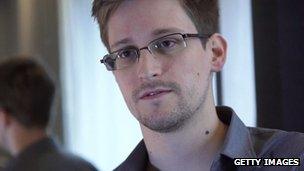Clegg and Cable disagree on Guardian Snowden leaks
- Published
Vince Cable: "I thought The Guardian, from a journalist's point of view, were acting perfectly correctly"
Liberal Democrat leader Nick Clegg and his cabinet colleague Vince Cable appear at odds about the Guardian's disclosure of secret surveillance.
Mr Cable said the newspaper performed a "very considerable public service" by publishing details of documents leaked by Edward Snowden.
But Mr Clegg reaffirmed his belief it was "not good at all" and said the information could "help terrorists".
Downing Street said the security services' review system works well.
A spokesman, however, said the prime minister is ready to listen to ideas for improving the system.
He was speaking as Mr Cable also called for "proper political oversight of the intelligence services".
Earlier, Sir David Omand, a UK security expert and former No 10 advisor described the leaks by Mr Snowden as the "most catastrophic loss to British intelligence ever".
'Good' system already
In May, Mr Snowden leaked information to the Guardian about mass surveillance programmes such as the US National Security Agency's Prism and GCHQ's Tempora operations.
The Guardian has defended its decision to publish documents leaked by the former US intelligence worker, who was granted asylum in Russia, and has vowed to publish more.
Mr Cable told BBC Radio 4' Today programme: "I think the Guardian has done a very considerable public service.
"I think Mr Snowden's contribution is two-fold. One is a positive one - the whistleblowing - the other is more worrying which is a large amount of genuinely important intelligence material does seem to have been passed across.
"We do need to have proper political oversight of the intelligence services and arguably we haven't until now."
But Mr Clegg told the BBC: "My view is that publishing information, technical information which can help terrorists work out how to do harm to us, of course, that is not good at all.
"But of course there is a legitimate, wider debate, an ongoing debate, about how do you make sure, as both the intelligence agencies and those who wish to do us harm, use these considerable new powers at their disposal in information technology, how do we make sure that all of that is held properly to account."
Jack Straw: 'Guardian's behaviour indulgent and irresponsible'
Earlier this year, the Justice and Security Act 2013 gave the government's Intelligence and Security committee greater powers to scrutinise the work of the security services.
Prime Minister David Cameron said there would be no review of the oversight of the security services, despite Guardian reports, external that Mr Clegg was to start conversations in government about one.
The prime minister said on Thursday "a good legal framework" already existed.
A spokesman said Mr Cameron "thinks the current system is a good one and it works well," but "if others have ideas he is prepared to listen to them".
'Seriously damaging'
Mr Clegg responded to the question of more oversight of the security services on Friday saying the government had already "significantly strengthened the powers of oversight".
But he added that "many of these revelations have quite rightly raised questions about how we can increase oversight further where that is clearly justified".
Former Home Secretary Jack Straw also hit out at the Guardian saying its stance was "indulgent irresponsibility" which did not help protect the public.
His comments come in an interview to be broadcast on the BBC's Sunday Politics Wales.
He said the Guardian had a "sense of power of having these secrets and excitement... about these secrets has gone to their heads".

Edward Snowden has leaked details of surveillance programmes to media outlets
"They are blinding themselves about the consequence and also showing an extraordinary naivety and arrogance in implying that they are in a position to judge whether or not particular secrets which they publish are - are or not - likely to damage the national interest," said Mr Straw.
Sir David, who is also a former head of the UK's communications surveillance centre GCHQ, told The Times, external there needed to be a difference acknowledged between whistleblowing to spark a debate and "the stealing of 58,000 top-secret British security documents" which he called "seriously, seriously damaging".
"The assumption the experts are working on is that all that information or almost all of it will now be in the hands of Moscow and Beijing," he added.
Nigel Inkster, who was director of operations and intelligence at MI6, and is now at the International Institute for Strategic Studies, told BBC Radio 4 programme The World at One he agreed with Sir David.
He said terrorists would have a better awareness of how vulnerable it was to communicate with each other "via any one or any group of communications options that are available to them".
He added that in terms of state-on-state espionage, "some of the reach and sophistication of the systems and capabilities developed by NSA and GCHQ have now been compromised".
- Published11 October 2013
- Published11 October 2013
- Published11 October 2013
- Published11 October 2013
- Published9 October 2013
- Published9 October 2013
- Published10 October 2013
- Published8 October 2013
- Published10 October 2013